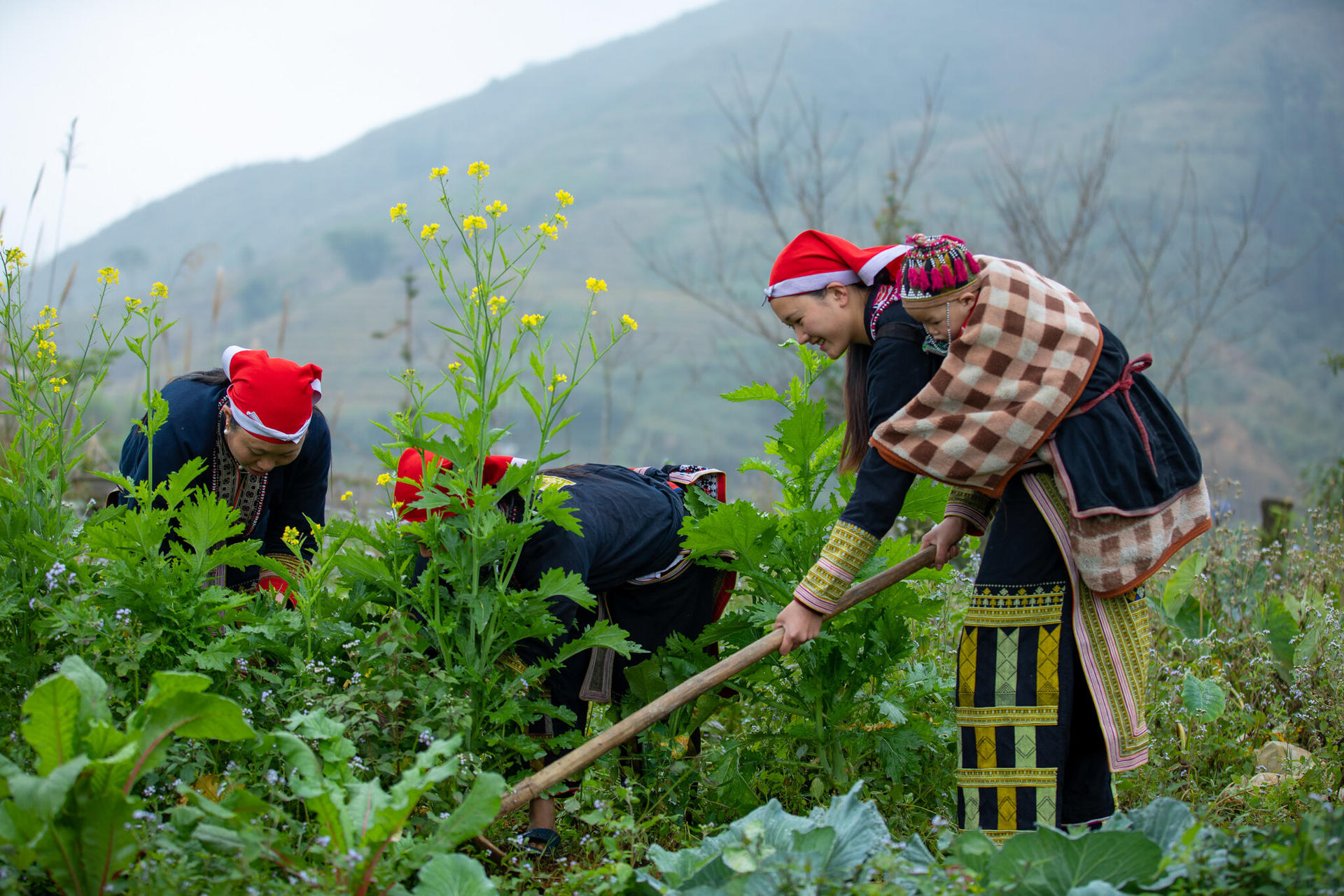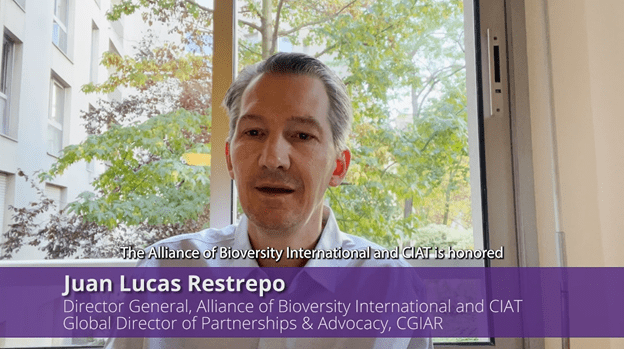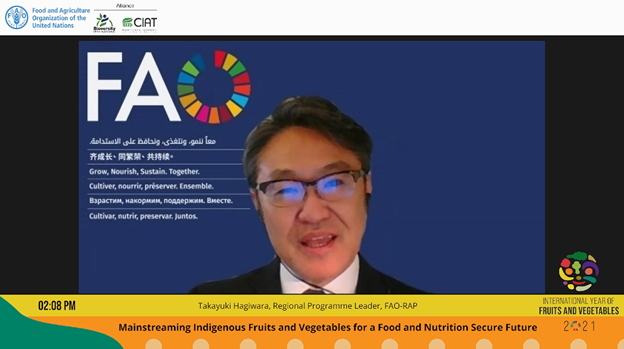Press and News Alliance and FAO celebrate International Year for Fruits and Vegetables

Indigenous Seed Systems in Northwestern Vietnam
Hmong mustard, Sa Pa, Lao Cai province, Vietnam.
© 2020 Alliance of Bioversity International and CIAT/Trong Chinh
To celebrate the International Year for Fruits and Vegetables, the Alliance teamed up with the FAO Regional Office for Asia and the Pacific to highlight the importance of indigenous fruits and vegetables in diets in the region.
The Alliance of Bioversity International and CIAT in Asia and the Food and Agriculture Organization of the United Nations Regional office for Asia and the Pacific (FAO-RAP) recently hosted a regional webinar on “Mainstreaming Indigenous Fruits and Vegetables for a Food and Nutrition Secure Future.” This event, brought together various country representatives, experts, and non-government organizations in Asia and the Pacific to capture various perspectives on how these crops are utilized and highlighted in various food and nutrition contexts in the region.
The webinar aimed to highlight the importance of indigenous and native fruit and vegetable species in bridging the gap in poverty and malnutrition in the region and around the world. More specifically, the webinar aimed to achieve the following:
- Highlight the importance of indigenous fruits and vegetables and indigenous custodian farmers and their knowledge on the management and use of traditional crops;
- Describe barriers to the utilization of indigenous fruits and vegetables;
- Enumerate success stories and lessons learned in mainstreaming indigenous fruits and vegetables in the region;
- Identify opportunities for convergence among key partners (governments, research organizations, private sector, civil society) to mainstream indigenous fruits and vegetables in the region;

Juan Lucas Restrepo, Director General of the Alliance of Bioversity and CIAT the celebration for the 2021 International Year of Fruits and Vegetables.
Juan Lucas Restrepo, Director General of the Alliance said that the collective work on indigenous fruits and vegetables opens opportunities in addressing issues related to the shift towards more homogenous food production and diets. “By learning from our own communities and supporting the production and consumption of indigenous fruits and vegetables, we are not only promoting nutritional quality and livelihoods but are also becoming stewards for resilience and environmental conservation,” Restrepo said.
FAO-RAP Regional Programme Leader Hagiwara Takayuki said the consumption and trade of important crops like fruits and vegetables are critical for the region. He emphasized that improving quality and market access to these foods can support economic development sustainably and inclusively.

Hagiwara Takayuki, FAO-RAP Regional Programme Leader at the 2021 International Year of Fruits and Vegetables.
Cases including lessons learned from the region were presented based on global, regional and country insights. The Global Environmental Facility (GEF)-funded project Biodiversity for Food and Nutrition (B4FN) was highlighted as a global insight case by Alliance Associate Scientist Teresa Borelli. Several partners who were involved in this project offered their cases in implementing the work in the context of the region and Sri Lanka. Dr. Prem Mathur, a senior consultant at the United Nations Development Programme, offered some lessons learned from the B4FN project at the regional level, while Dr. Gamini Samarasinghe presented Sri Lanka’s insights from, the project.
In addition to B4FN, the Alliance and its partners contributed an ongoing case on understanding and leveraging local vegetable seed systems among ethnic minority communities in Northern Vietnam. This work was presented by Dr. Ngo Thi Hanh, Head of the Department of Vegetables and Spicy Crops at the Fruit and Vegetable Research Institute, one of the consortium partners in implementing the integrated vegetable seed systems development project, funded by the Dutch Research Council (NWO).
Hanh’s discussion revolved around the multi-level seed system characterization study conducted as part of this project, which revealed a large diversity of vegetables with varying levels and periods of availability. This opens opportunities for promotion, sharing & exchange of existing local variety provides an opportunity to improve seasonal availability. Both self-saved and purchased seeds were important for ethnic minority smallholder farmers. However, they have encountered multiple barriers to seed access, including inconsistent or unguaranteed seed quality, insufficient quantities of preferred vegetables, inadequate access to appropriate information, poor post-harvest and storage practices (for farmer-saved seed), high cost of seed and long distances to markets (for purchased seed).
Identified intervention opportunities to enhance local vegetable seed systems included nutrition education, promotion of seed exchange, improving farmer capacity to produce and save seed of local vegetables, development of nutrition-sensitive value chains for income generation, and conservation and multiplication of local and nutritious vegetable varieties.
The last speaker to share case studies was Dr. Rajasekharan who stepped in for Dr. BNS Murthy to talk about India’s initiatives on linking indigenous fruit and vegetable diversity for sustainable livelihood and national security.

International Year of Fruits and Vegetables 2021 Group Photo
Finally, panelists representing regional organizations, non-government organizations, academia, and research and development organizations talked about existing barriers and opportunities to overcome these to ensure proper mainstreaming of indigenous fruits and vegetables in Asia and beyond.
Overall, inputs from the webinar emphasized that in order to mainstream these underutilized crops governments and partners should be able to capture the strong nutritional aspect of indigenous fruits and vegetables in promoting their importance. Common points made during the discussions also highlighted essential activities like linking value chains, enterprise and policy development, and creating enabling environments to capture local knowledge.
International Year of Fruits and Vegetables 2021, Webinar held on 14 September, 2021
In case you missed the September 14, 2021 webinar, you can catch up.
